|
 Secure Site
Secure Site
|
 |
Archive for the 'intention' Category
 Mindfulness Practice - Meditation I sat cross-legged on the living-room rug, closed my eyes, took a deep breath, and tried to quiet my mind. Alas, random thoughts persisted, flickering about like fireflies on a summer evening. After five minutes, I abandoned my Zen pose. I would have rather folded laundry or gone on a 3-mile run—anything with more tangible results.
One day, I shared my frustrations about meditating correctly with a practiced teacher and learned that there was no wrong way to meditate—it would be like breathing wrong. I was trying too hard. She suggested I come to her meditation group, but meditating with a dozen other people sounded distracting, and sitting in a library chair wasn’t exactly my definition of bliss. But I liked her “can’t do it wrong” approach, so I ventured to the library basement for this “meditation spa.”
The first thing I noticed was the particularity of the circular chair positioning. As a writer, I appreciated such attention to flow. A more sporadic placement, like an awkward transition or misplaced passage, would have detracted from the whole. Mood music, dimmed lights, and quiet conversation helped me relax. Sensing we were ready, our instructor asked us to close our eyes and inhale deeply. On the exhale, we joined her in chanting om, releasing our breath for as long as possible. We did this three times, our voices overlapping in one long melodious note, as tranquil as a wind chime. The chanting slowed my breathing and stilled my mind for a short time, and when thoughts popped up, I did my best to ignore them. Then the instructor asked us to drink in a white light, each breath filling us up like a balloon. After about 20 minutes, she gently “brought us back,” though there was no place to come back from with the sound of a Zen Meditation Timer. We’d never left the library basement.
What I discovered was that meditating perfectly is not only unattainable—it’s missing the point. It’s not the mantra, the breathing, the teacher, or the time of day; instead, it is the simplicity of peace and silence I found within myself through meditating. Now when I meditate, I don’t get upset when I worry or when I can’t empty my mind. Instead, I try to open myself a little more each time to the stillness that has always been there.
adapted from Natural Solutions Magazine, July 2008 by Susan Lembo Balik
The Walnut Digital Zen Clock’s long-resonating Tibetan bell-like chime makes waking up and meditating a beautiful experience! When the clock’s alarm is triggered, the acoustic chime bar is struck just once … 3-1/2 minutes later it strikes again … chime strikes become more frequent over 10 minutes … eventually striking every 5 seconds until shut off.
Our Meditation Chime Timer also serves as a countdown and interval timer for yoga, meditation, bodywork, etc.; and it can also be set to chime on the hour as a tool for “mindfulness.”
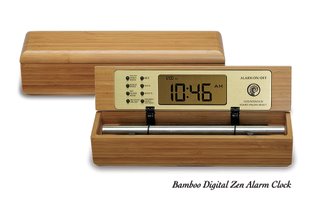 Zen Meditation Timer in Bamboo with Natural Acoustic Chime Now & Zen’s Meditation Chime Timer Shop
1638 Pearl Street
Boulder, CO 80302
(800) 779-6383
Posted in intention, Meditation Timers, Meditation Tools, mindfulness practice, Zen Timers
 winter self massage During winter, nature sighs deeply and burrows down for a long sleep. Like the denning bears and squirrels, use these cozy times to reduce stress. Especially in urban environments, we often become detached from this seasonal message. Continuing at a frenzied pace, we develop anxiety, high blood pressure, and digestive upset. To reduce stress, “in winter we focus a lot more on massage and nutrition,” says hydrotherapist Kristi Zimmer. Try this self-massage five minutes before bed and just after waking up in the morning: Set your Zen Chime Timer for 5 minutes. Lie on your back and make gentle circular motions around your belly with both hands, going clockwise as you breathe deeply. After five minutes of this, leave your hands on your stomach as you take 20 deep breaths, sending the breath to your organs. The deep breathing calms the body and mind, while the massage aids digestion.
adapted from Natural Solutions Magazine, January 2007 by Nora Isaacs
 Chime Timers in Bamboo with Natural Acoustic Chimes Now & Zen’s Natural Chime Timer Store
1638 Pearl Street
Boulder, CO 80302
(800) 779-6383
Posted in Bamboo Chime Clocks, Chime Alarm Clocks, intention, Meditation Timers, Meditation Tools, mindfulness practice, Natural Awakening, Well-being, Zen Timers
 Use Mindfulness Practices to Stop Stress You’re cut off while driving. Your children erupt into a screaming fight. Or you’re five minutes away from an interview for the job of your dreams and your composure evaporates in a rush of anxiety. When life delivers adversity, stress is the common response. Your body kicks into action, preparing for a fight. The adrenal glands pump out adrenaline and noradrenaline — hormones that increase the heart rate, quicken breathing, raise blood pressure, and tense muscles. You’re ready to take on the perceived threat to your safety or well-being.
Of course, in reality we rarely run from foes or physically challenge them. As a result, we don’t burn off these powerful hormones, leaving them to “course through our bloodstream,” explains Dr. Herbert Benson, a pioneer in stress research at Harvard Medical School’s Mind/Body Medical Institute. In the short term, a pounding heart and sweaty palms can exacerbate the stressful emotions you’re already feeling. Left unchecked, this chemical mix sets you up for an array of physical and emotional problems, says Benson, including anxiety, depression, and intensified PMS and menopause symptoms.
The next time you are facing a stressful situation, stop yourself from spiraling out of control and bring yourself back to center.
Our Zen Timepiece’s acoustic 6-inch brass bowl-gong clock & timer is the world’s ultimate alarm clock, practice timer, and “mindfulness bell.”
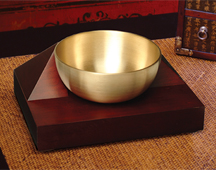 Acoustic Chime Timer and Alarm Clocks from Now & Zen - Boulder, CO
It fills your environment with beautifully complex tones whenever it strikes. In the morning, its exquisite sounds summon your consciousness into awakening with a series of subtle gongs that provide an elegant beginning to your day. Once you experience the Zen Timepiece’s progressive awakening, you’ll never want to wake up any other way. It also serves as the perfect meditation timer and ‘mindfulness practice clock’.
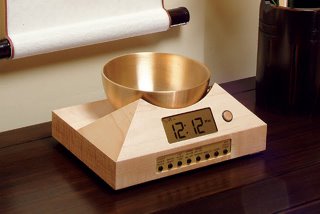 Mindfulness Practice Timer with Singing Bowl Adapted from Body + Soul, text by Erin O’Donnell
Now & Zen Meditation Timer Store
1638 Pearl Street
Boulder, CO 80302
(800) 779-6383
Posted in Bamboo Chime Clocks, Chime Alarm Clocks, intention, Japanese Inspired Zen Clocks, Meditation Tools, mindfulness practice, Now & Zen Alarm Clocks, Truth, Well-being
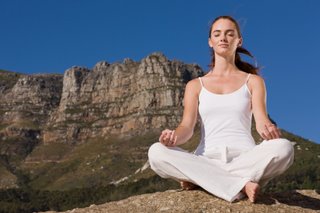 meditation trains your brain Using a magnetic resonance imaging (MRI) machine, Eileen Luders, a re-searcher in the Department of Neurology at the University of California Los Angeles School of Medicine, looks for evidence that meditation changes the physical structure of the brain. Until recently, this idea would have seemed absurd. “Scientists used to believe that the brain reaches its peak in adulthood and doesn’t change—until it starts to decrease in late adulthood,” Luders says. “Today we know that everything we do, and every experience we have, actually changes the brain.” Indeed, Luders finds several differences between the brains of meditators and nonmeditators. In a study published in the journal NeuroImage in 2009, Luders and her colleagues compared the brains of 22 meditators and 22 age-matched nonmeditators and found that the meditators (who practiced a wide range of traditions and had between 5 and 46 years of meditation experience) had more gray matter in re-gions of the brain that are important for attention, emotion regulation, and mental flexibility. Increased gray matter typically makes an area of the brain more efficient or powerful at processing information. Luders believes that the increased gray matter in the meditators’ brains should make them better at controlling their attention, managing their emotions, and making mindful choices.
Why are there differences between the brains of meditators and nonmeditators? It’s a simple matter of training. Neuroscientists now know that the brain you have today is, in part, a reflection of the demands you have placed on it. People learning to juggle, for example, develop more connections in areas of the brain that anticipate moving objects. Medical students undergoing periods of intense learning show similar changes in the hippocampus, an area of the brain important for memory. And mathematicians have more gray matter in regions important for arithmetic and spatial reasoning.
More and more neuroscientists, like Luders, have started to think that learning to meditate is no different from learning mental skills such as music or math. Like anything else that requires practice, meditation is a training program for the brain. “Regular use may strengthen the connections between neurons and can also make new connections,” Luders explains. “These tiny changes, in thousands of connections, can lead to visible changes in the structure of the brain.” Those structural changes, in turn, create a brain that is better at doing whatever you’ve asked it to do. Musicians’ brains could get better at analyzing and creating music. Mathematicians’ brains may get better at solving problems. What do meditators’ brains get better at doing? This is where it gets interesting: It depends on what kind of meditation they do.
Over the past decade, researchers have found that if you practice focusing attention on your breath or a mantra, the brain will restructure itself to make concentration easier. If you practice calm acceptance during meditation, you will develop a brain that is more resilient to stress. And if you meditate while cultivating feelings of love and compassion, your brain will develop in such a way that you spontaneously feel more connected to others.
The Zen Meditation Timer and Clock’s long-resonating Tibetan bell-like chime makes waking and meditating a beautiful experience – its progressive chimes begin your day with grace.
adapted from Yoga Journal, By Kelly McGonigal
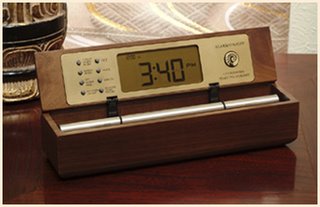 Digital Zen Alarm Clock, a meditation timer and progressive alarm clock Now & Zen’s Meditation Timer Shop
1638 Pearl Street
Boulder, CO 80302
(800) 779-6383
Posted in Bamboo Chime Clocks, intention, Meditation Timers, Meditation Tools, mindfulness practice, Now & Zen Alarm Clocks, Zen Timers
 Morning meditation Sense the Stillness in the Morning
For yoga instructor Alison Novie, mornings make an ideal time for meditation — perhaps more than any other time of day. “The sun’s about to rise, but it’s still sort of dark and quiet,” says Novie, who wakes at 5:00 a.m. to meditate. “I get up, brush my teeth, light a candle, and then sit for half an hour. The calm energy I get from that morning meditation carries me through the day.”
You don’t have to be a regular yoga or meditation practitioner to reap the benefits of a morning meditation ritual. Start with five minutes daily, using the guidelines that follow. Set you Meditation Timer from Now & Zen for 5 minutes. Then over the course of a few weeks — or when you are ready — gradually work up to 10 minutes. Remember, with meditation it’s quality, not quantity, that matters.
Start with awareness. Rather than lunge out of bed, Novie suggests waking up slowly. “Spend a few minutes just becoming conscious of the sensations of your body. Awareness is such a beautiful way of entering your day.” Once you’re up, resist the temptation to check your e-mail, flip on the radio, or do any of the other countless things that draw you out of yourself and into the concerns of the world. Instead, keep the focus inward.
Find a comfortable spot. Practice your five minutes of meditation anywhere you like (the bedroom floor, a favorite chair) except the bed, where you may fall back to sleep. To enhance the sacred aspect of her meditation space, Novie set up a small altar in her living room that she uses only for meditation, giving the space a positive energy of its own. Be sure to set your Meditation Timer from Now & Zen for 5 minutes.
Sense your breath. Close your eyes. Feel your breath moving in and out of your body without controlling it. Bring your attention to the rise and fall of your abdomen or to the tip of your nose. The more awareness you bring to breath and body, the more grounded in your body you’ll become. This, in turn, will help relieve some of the stress that comes with getting through your morning.
Don’t try to block your thoughts. Your mind will wander — that’s what it’s designed to do. Rather than try to fight off thoughts as they emerge, acknowledge them, but don’t engage them. And give yourself some slack — meditation is, after all, a practice, not perfection.
Our Zen Timepiece’s acoustic 6-inch brass bowl-gong clock is the world’s ultimate alarm clock, practice timer, and “mindfulness bell.”
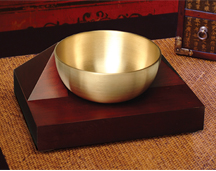 Meditation Gong Timer with Singing Bowl It fills your environment with beautifully complex tones whenever it strikes. In the morning, its exquisite sounds summon your consciousness into awakening with a series of subtle gongs that provide an elegant beginning to your day. Once you experience the Zen Timepiece’s progressive awakening, you’ll never want to wake up any other way. It also serves as the perfect meditation timer.
adapted from Body + Soul, March 2006

Now & Zen’s Clock Shop
1638 Pearl Street
Boulder, CO 80302
(800) 779-6383
Posted in Bamboo Chime Clocks, Chime Alarm Clocks, intention, Natural Awakening, Now & Zen Alarm Clocks, sleep, Sleep Habits
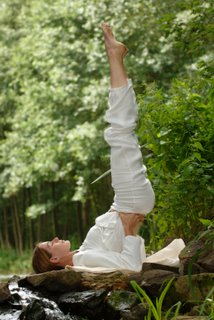 wellness practice of the day Before the hustle-bustle of the holidays throws your routine off-kilter, take some time to reconnect with the earth, viewed in most mind-body traditions as the source of power and stability. “We’re often mentally hovering a few feet above the ground,” says Kate Hanley, author of “The Anywhere, Anytime Chill Guide.” “It’s important to get back in touch with the ground beneath you.” So make a five-minute savasana your new daily habit: Set your Zen Wellness Timer for 5 minutes, lie on your back with your eyes closed, listening to your breath and feeling the earth support you.
adapted from Wholeliving.com, October 2010
Use our unique “Zen Clock” which functions as a Yoga & Meditation Timer. It features a long-resonating acoustic chime that brings your meditation or yoga session to a gradual close, preserving the environment of stillness while also acting as an effective time signal. Our Yoga Timer & Clock can be programmed to chime at the end of the meditation or yoga session or periodically throughout the session as a kind of sonic yantra. The beauty and functionality of the Zen Clock/Timer makes it a meditation tool that can actually help you “make time” for meditation in your life. Bring yourself back to balance.
 Wellness Timer, The Digital Zen Alarm Clock in Solid Walnut
Now & Zen – The Zen Alarm Clock Store
1638 Pearl Street
Boulder, CO 80302
(800) 779-6383
Posted in intention, mindfulness practice, Well-being, Yoga Timer, Yoga Timers by Now & Zen, Zen Timepiece by Now & Zen, Zen Timers
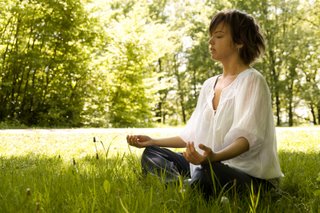 what time is best to meditate? Are certain times more favorable for meditation than others? Yes. In the morning and evening, when day and night mometarily mingle, nature draws the mind inward. As a result, many choose to med-itate just after awakening or in the evening, near sunset.
Unfortunately, many of us have lost our sensitivity to nature’s influence, and we do not feel the internal pull created by the joining of night and day. But by paying attention as dawn or dusk approaches, we can observe nature’s work. Winds quiet down, animals hush, and the sky floods with color. The mind is also quieted in these moments, and as night and day briefly embrace, our concentration and our sense of inner balance deepen.
There are some practitioners who choose night hours for meditation. A familiar verse in one of yoga’s most beloved texts, the Bhagavad Gita, explains, “That which is night for most living beings is like day for one whose senses are controlled; that which is day for most living beings is like night for the introspective sage.” In the silence of night, when others sleep, a meditator finds pleasure in meditation. But the outward affairs of daily life are like sleep to a sage. That is why some meditators choose to practice at bedtime or in the very early morning when the darkness is conducive to meditation.
Although these various times are all recommended, it is important not to neglect one more suggestion, which is to meditate at the time that works best for you. That might mean meditating at the beginning of a lunch break, at the end of the workday, or when your children are napping. Finding the time that best fits your personal schedule makes it more likely that you will settle into a regular practice.
adapted from Yoga International by Rolf Solvik, May/June 2007
Use our unique “Zen Clock” which functions as a Yoga & Meditation Timer. It features a long-resonating acoustic chime that brings your meditation or yoga session to a gradual close, preserving the environment of stillness while also acting as an effective time signal. Our Yoga Timer & Clock can be programmed to chime at the end of the meditation or yoga session or periodically throughout the session as a kind of sonic yantra. The beauty and functionality of the Zen Clock/Timer makes it a meditation tool that can actually help you “make time” for meditation in your life. Bring yourself back to balance.
 Timers with chime, perfect for meditating day or night... Now & Zen – The Zen Alarm Clock & Meditation Timer Store
1638 Pearl Street
Boulder, CO 80302
(800) 779-6383
Posted in intention, Meditation Timers, Meditation Tools, mindfulness practice
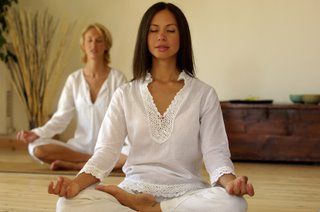 mindfulness practices People have been meditating for so long that no one can really say when or how it got started, but the reasons they do it haven’t changed much. Over the centuries, meditators have consistently found that their practice keeps them focused and emotionally stable, helps them to adapt to new situations, cope with stress in a positive manner, and be more creative. And yet, there is something more to it.
It’s difficult to define meditation in a way that accounts for the wide variety within established meditation traditions. Undoubtedly, specific techniques have evolved within each tradition to address specific human needs and to develop specific potentials, but much of what people call meditation may be better described as systematic relaxation, visualization, working with the breath, simple concentration, or just “spacing out.”
One of the promising ways we can get at a more complete definition of meditation is to look at what is happening in the brains and bodies of people from different meditation traditions when they are doing their practice and see what is similar and what is different. It may be that all meditative activity looks the same to the brain. Or we may find that certain practices engage specific parts of the brain and this is why they are suited to developing particular latent potentials of the mind.
Recently modern science has developed sophisticated tools to explore meditative practice for clues to how it affects our body and brain. And what they have been finding sheds new light on the power of meditation to make a measurable difference in our experience of the world. Even though there is a wide variety of studies being done these days, following a number of different approaches to meditation, the general trend of this research shows that we can exercise some degree of control over things we didn’t think we could change. The scientific study of meditation shows that once we break through our preconceived notions about human capacity, new possibilities for self-transformation abound.
adapted from Yoga International, by Jon Janaka
Use our unique “Zen Clock” which functions as a Yoga & Meditation Timer. It features a long-resonating acoustic chime that brings your meditation or yoga session to a gradual close, preserving the environment of stillness while also acting as an effective time signal. Our Yoga Timer & Clock can be programmed to chime at the end of the meditation or yoga session or periodically throughout the session as a kind of sonic yantra. The beauty and functionality of the Zen Clock/Timer makes it a meditation tool that can actually help you “make time” for meditation in your life. Bring yourself back to balance.

- Mindfulness Practice Tools for Wellness
Now & Zen –
The Zen Meditation Timer Store
1638 Pearl Street
Boulder, CO 80302
(800) 779-6383
Posted in intention, Meditation Timers, Meditation Tools, mindfulness practice
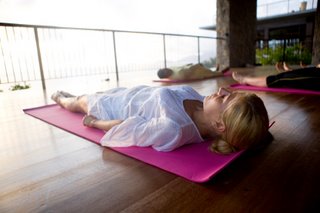 Resting Yoga Practice A harmonizing practice for people in recovery
As you practice the following sequence, remember to honor your limitations, going to your edge with love and acceptance rather than judgment and discouragement. If you are unable to move into a posture at this time, focus on breath-ing deeply as you think about the affirmation—that in itself is healing. At the end of the routine, take some time to write down your thoughts.
1. Sitting Mountain Vajrasana, variation
Benefits Opens the heart and invites stillness into the body.
Affirmation Serenity comes when I surrender.
Kneel on the floor, with your knees pointed forward and your feet stretched behind you. Now sit back on your heels so that your back is upright. You can put a pillow under your buttocks or knees for padding in order to be comfortable in the position; if you cannot kneel, sit on a chair so that your spine remains straight rather than hunched over. Relax your shoulders. Keep your chest open. Breathe deeply and slowly to help you relax the body and mind. Imagine that you are firmly planted like a mountain, energy going up your spine, feeling strong and serene.
Use our unique “Zen Clock” which functions as a Yoga Timer. It features a long-resonating acoustic chime that brings your meditation or yoga session to a gradual close, preserving the environment of stillness while also acting as an effective time signal. Our Yoga Timer & Clock can be programmed to chime at the end of the meditation or yoga session or periodically throughout the session as a kind of sonic yantra. The beauty and functionality of the Zen Clock/Timer makes it a meditation tool that can actually help you “make time” for meditation in your life. Bring yourself back to balance.
adapted from Yoga Journal by Annalisa Cunningham, author of Healing Addictions with Yoga
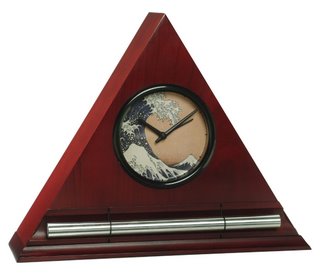 yoga tools and clocks with chimes Now & Zen – The Zen Yoga Timer Store
1638 Pearl Street
Boulder, CO 80302
(800) 779-6383
Posted in intention
 lavendar The best herbs to relax after the holiday season.
Shopping, relatives, money—stress. The holiday season is supposed to be a time of joy, but it can also be exhausting. We asked some herbalists and health-care providers to suggest ways to relax after the holidays.
Relieve tension by filling a sachet with dried hops. Tuck it next to your pillow and settle down for a peaceful sleep. The aroma of hops is mildly sedative.
—Portia Meares, herbalist and author, Wolftown, VA
Unwind by soaking in a bath scented with a few drops of lavender oil.
Curl up with a cup of lemon-balm tea. Place 1 tablespoon of the dried herb in a tea ball, drop it in a teacup, add hot water. Set your Zen Timer with Chime and steep for 10 minutes.
Escape to a sunny vacation spot where you can relax in seclusion. People should vacation in winter, rather than summer; sunny weather gives people stamina to juggle busy schedules, while cold, short winter weather depletes energy.
—Paul Bergner, clinic director at the Rocky Mountain Center for Botanical Studies, Boulder, CO
Nourish the nervous system with herbal adaptogens such as oat seed. This herb contains alkaloids, believed to protect and rebuild the myelin sheath surrounding nerve cells. Take 30 drops of the extract twice a day.
Inhale the calming scent of rosemary essential oil. Mix a few drops into hand lotion or place a drop or two on a cotton ball.
—Feather Jones, practicing herbalist and owner of Turtle Island Herbs, Boulder, CO
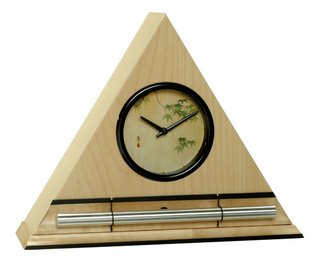 Zen Alarm Clock with Gentle Chime for Stress Reduction
Now & Zen
1638 Pearl Street
Boulder, CO 80302
(800) 779-6383
Posted in intention, nature, Now & Zen Alarm Clocks, wake up alarm clock
« Previous Page — « Previous Entries
Next Entries » — Next Page »
|
|
|
|